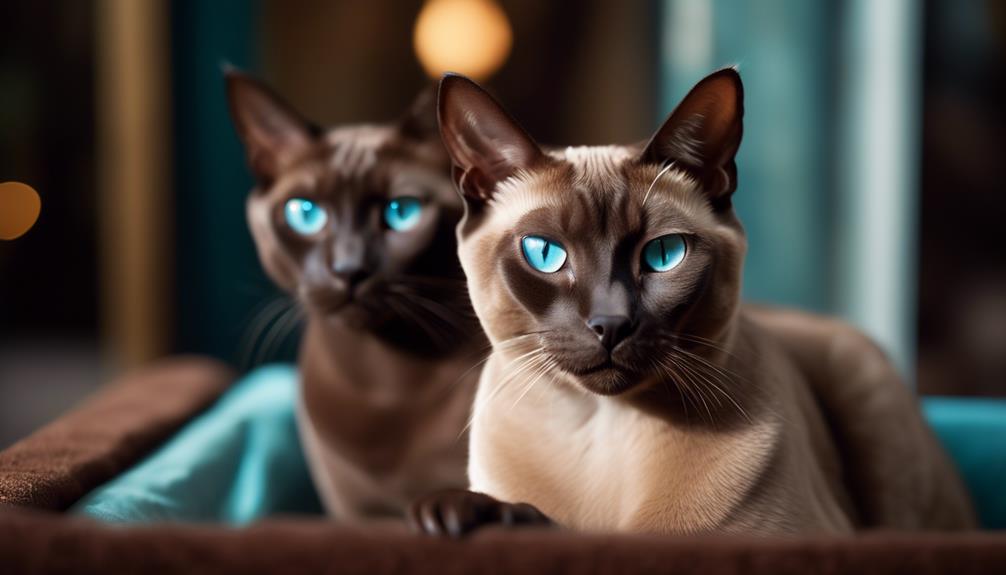
The Tonkinese cat breed is a captivating blend of Siamese and Burmese ancestry, resulting in a feline companion with unique characteristics and traits.
Originating in the United States, these medium-sized cats have captured the hearts of many with their loving nature and moderate body type.
But there is much more to discover about this intriguing breed, from their intelligence and playfulness to their potential health concerns and grooming needs.
So, if you’re curious to learn more about the captivating world of Tonkinese cats, prepare to embark on a journey that will unravel the many fascinating aspects of this breed.
Key Takeaways
- The Tonkinese cat breed is a crossbreed between Siamese and Burmese cats, resulting in a medium-sized cat with a moderate body type.
- Tonkinese cats have short, fine, and silky coats that come in various colors, and eye colors depend on the coat color.
- They are known for their intelligent, playful, and doting temperament, enjoying being involved in family activities and demanding attention and affection.
- While generally healthy, Tonkinese cats may be prone to certain genetic health conditions, such as heart disease and dental problems, requiring regular dental hygiene and eye cleaning.
Origin and History
The origin and history of the Tonkinese cat breed can be traced back to its development as a crossbreed between Siamese and Burmese cats.
The breed originated in the United States and was officially registered as Tonkanese in 1967, which was later changed to Tonkinese in 1971.
The breed’s development aimed to create a cat with a moderate body type, a less piercing voice than the Siamese, and a loving nature.
Wong Mau, a Burmese cat, played a significant role in the breed’s development.
The Tonkinese is a medium-sized cat with a moderate and proportional body, slim legs, and a muscular build.
Its coat comes in various colors and patterns, including mink, solid, and pointed shades.
See another cat breed profile.
Toyger
Size and Appearance
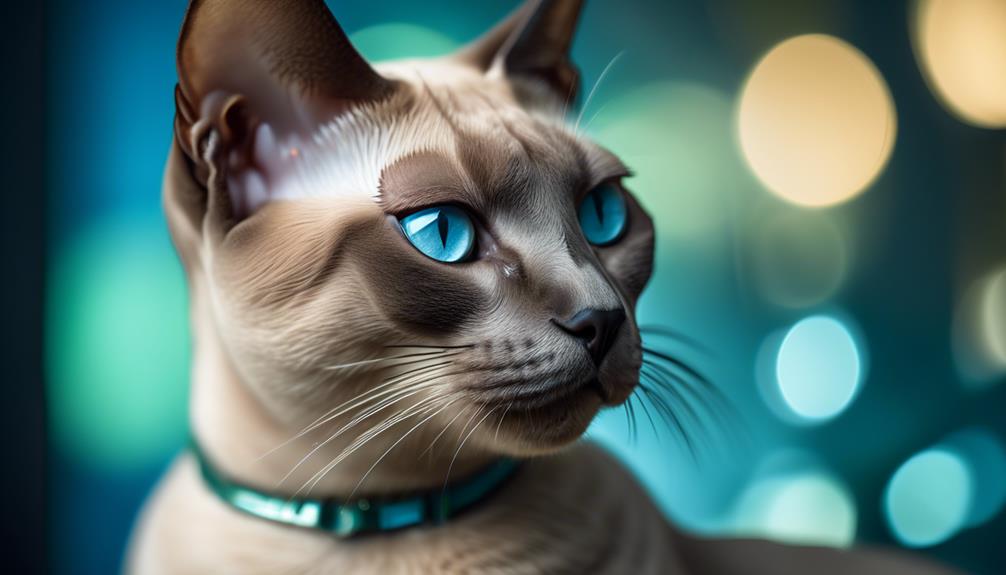
With a medium size and a well-proportioned body, the Tonkinese cat exudes an elegant and athletic appearance.
This breed has a moderate and proportional body, slim legs, and a muscular build.
Tonkinese cats are neither large nor small, giving them a balanced and graceful presence.
Their sleek and short coat adds to their sleekness, which is soft, fine, and silky.
The coat comes in various colors and patterns, including mink, solid, and pointed shades.
Tonkinese cats have captivating eyes that can be blue, green, or gold, depending on their coat color.
Temperament and Personality Traits
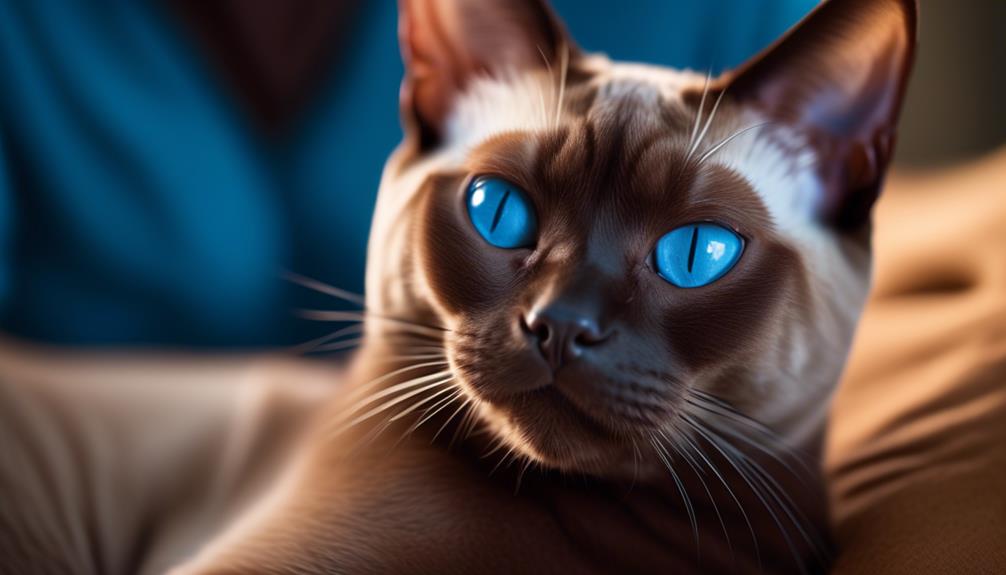
Tonkinese cats are known for their intelligent and playful nature, making them an engaging and interactive breed.
Their temperament and personality traits can be summarized as follows:
- Social and friendly:
- Tonkinese cats enjoy being involved in family activities and are social with new people.
- They are not content with staying home alone all the time and thrive on companionship.
- Loving and affectionate:
- Tonkinese cats are doting and demand attention and affection from their owners.
- They form strong bonds with their human companions and enjoy being a part of their lives.
With their curious and active nature, Tonkinese cats bring joy and entertainment to any household.
They are intelligent and easy to train, making them a delightful addition to families seeking a playful and loving companion.
Health Concerns and Considerations
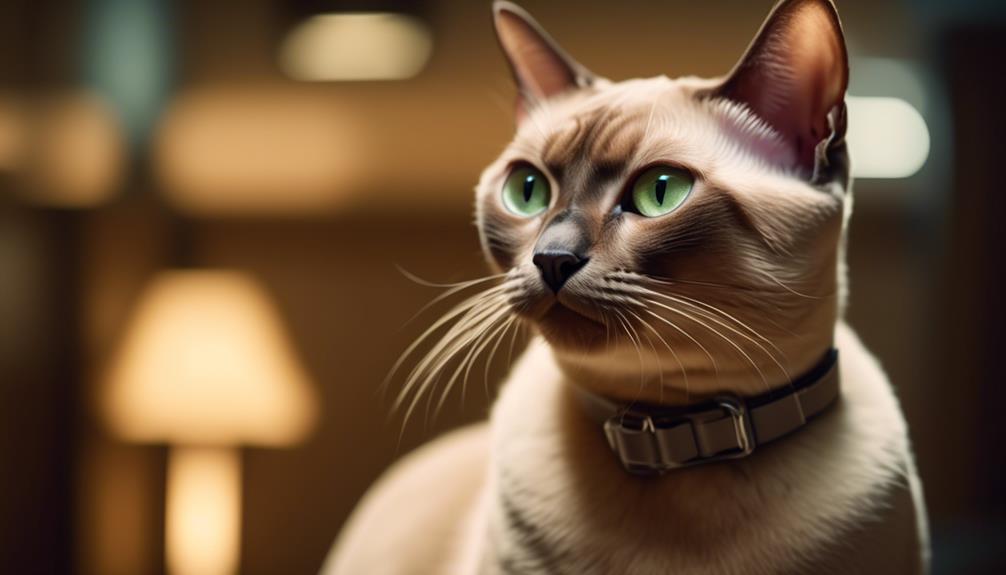
Moving on to the important aspect of Tonkinese cats’ well-being, addressing the health concerns and considerations associated with this breed is crucial.
While generally healthy, Tonkinese cats are prone to certain genetic health conditions, such as heart disease (HCM) and dental problems.
They are also sensitive to anesthesia and may experience gingivitis, amyloidosis, asthma, congenital heart defects, gastrointestinal conditions, hyperesthesia syndrome, and lymphoma.
Tonkinese cat owners must be aware of these potential health issues and take proactive measures to ensure their cat’s well-being.
Regular veterinary check-ups, proper dental hygiene, and a healthy diet are essential for maintaining the health and longevity of Tonkinese cats.
Exercise and Training Needs
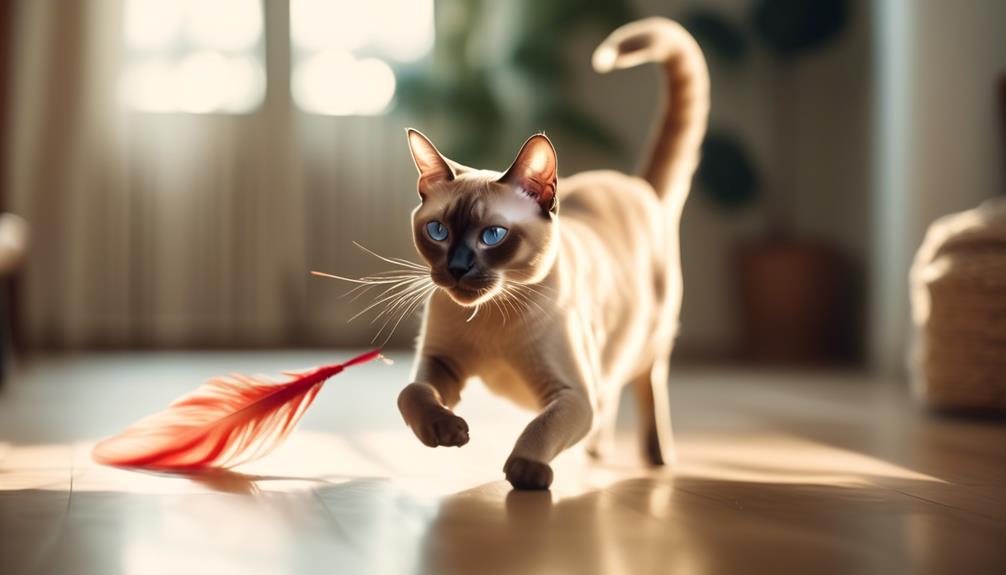
It is important to address their exercise and training needs to ensure the well-being and proper development of Tonkinese cats.
These cats have moderate to high exercise requirements, and regular physical activity is essential to keep them happy and healthy.
Here are some key points to consider:
- Exercise Needs:
- Tonkinese cats are naturally active and playful, so they need ample opportunities for exercise and mental stimulation.
- Engaging them in interactive play sessions, such as using puzzle toys or playing with feather wands, can help satisfy their need for physical and mental stimulation.
- Training:
- Tonkinese cats are intelligent and eager to please, making them relatively easy to train.
- Positive reinforcement techniques, such as treats and praise, work well with these cats.
- Training them to use a scratching post and litter box early is important to prevent destructive behavior.
Grooming and Care Tips
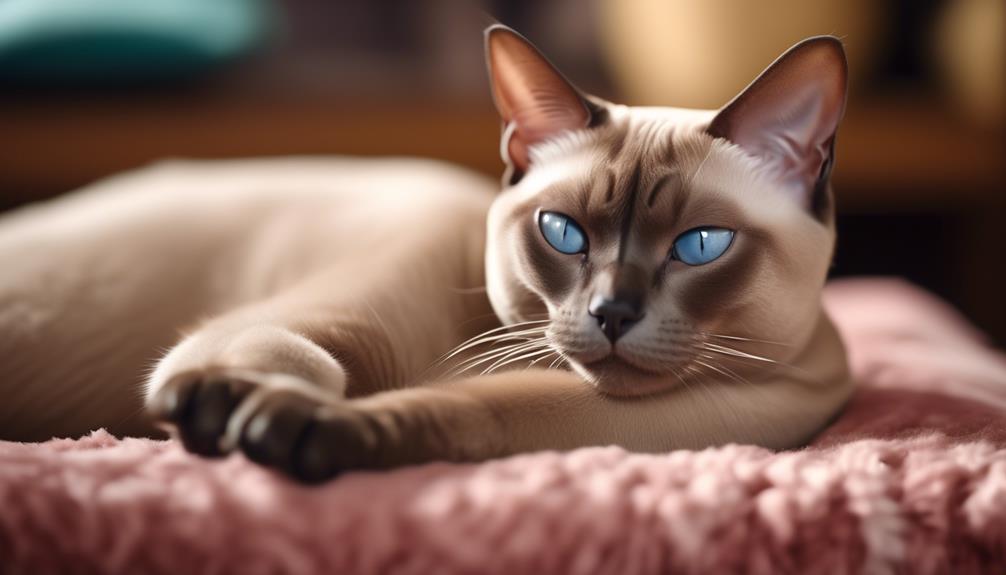
Addressing Tonkinese cats’ grooming and care needs is crucial to maintaining their overall health and well-being.
Despite their short, fine, and silky coats, Tonkinese cats require weekly brushing to keep their fur in good condition and minimize shedding.
Regular dental hygiene and eye cleaning are essential to prevent dental problems and maintain good eye health.
Weekly ear cleaning with cider vinegar and warm water helps prevent ear infections.
While Tonkinese cats generally have clean and odor-free coats, bathing is rarely necessary unless they get filthy.
Providing them with a balanced diet, fresh water, and regular veterinary check-ups is important to ensure their optimal health.
Coat Colors and Patterns
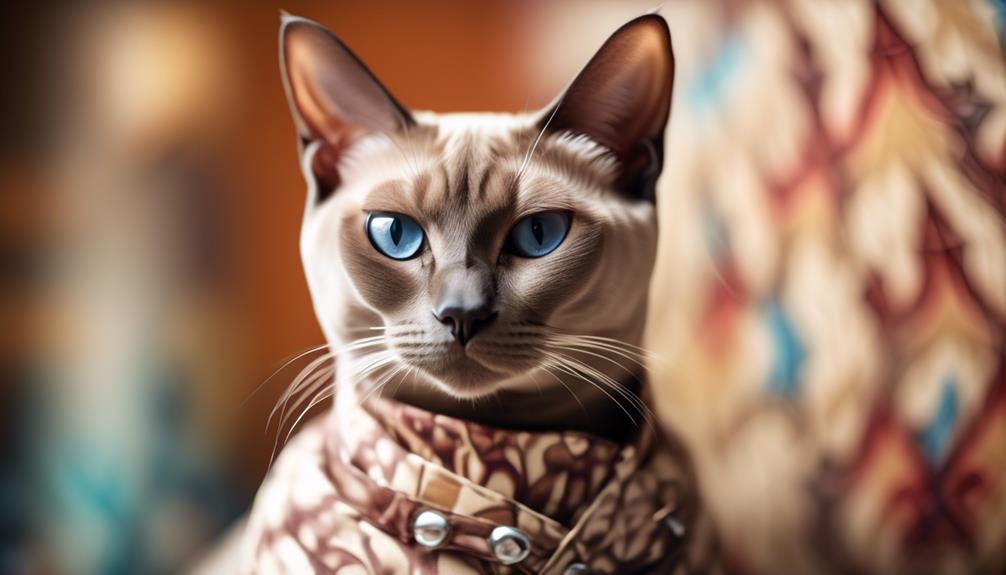
The Tonkinese cat breed showcases a variety of captivating coat colors and patterns.
These beautiful felines come in four primary coat colors: natural, champagne, blue, and platinum.
Each color has three patterns: solid, pointed, and mink.
The solid pattern features a uniform color throughout the cat’s body.
Like Siamese cats, the pointed pattern has a lighter body with darker points on the face, ears, paws, and tail.
The mink pattern combines solid and sharp patterns with a more lightweight body and slightly darker points.
Additionally, Tonkinese cats can have various eye colors, including blue, green, gold, and aqua.
Their stunning coat colors and patterns add to their charm and allure.
Socialization and Interaction With People
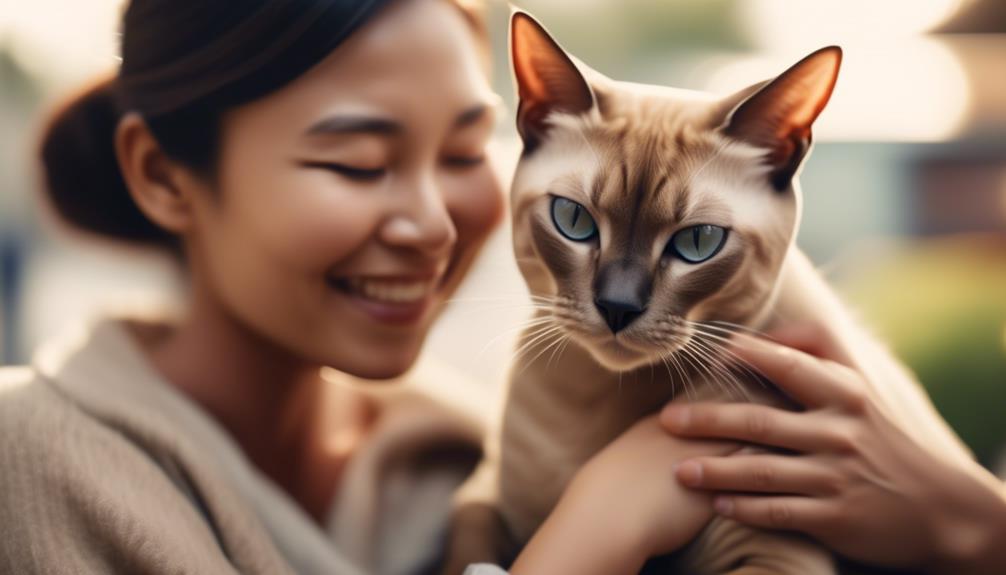
Tonkinese cats are known for their friendly and interactive nature, making them excellent companions for people of all ages.
These cats thrive on human interaction and enjoy being involved in family activities.
They are social with new people and are not content with staying home alone all the time. Tonkinese cats demand attention and affection and love to be the center of attention.
Their friendly and loving personality makes it easy for them to bond with and create a strong connection.
Whether playing games, cuddling on the couch, or simply being by your side, Tonkinese cats are always eager to engage and interact with their human companions.
| Traits | Description |
|---|---|
| Sociable | Tonkinese cats are very social and enjoy the company of people. They are not aloof and love to be a part of family activities. |
| Interactive | These cats are highly interactive and love to engage with their human companions. They enjoy playing games and being involved in various activities. |
| Affectionate | Tonkinese cats are known for their affectionate nature. They demand attention and love to cuddle and be close to their owners. |
| Friendly | Tonkinese cats are friendly and warm towards people. They are social with new people and make friends easily. |
| Playful | These cats have a playful nature and enjoy interactive playtime. They have a high energy level and love to chase toys and engage in games with their owners. |
Living Environment and Home Suitability
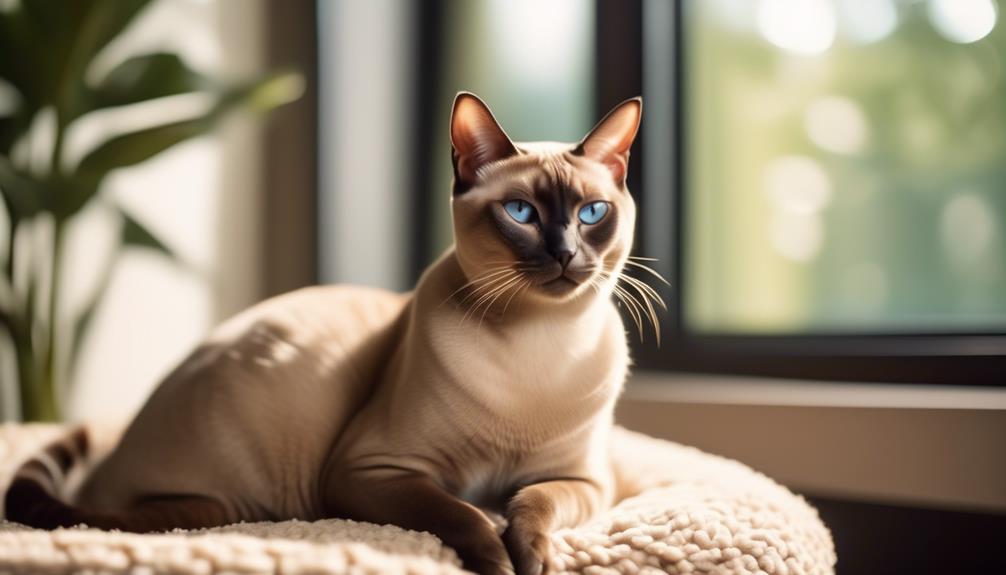
Creating an ideal living environment and ensuring home suitability for Tonkinese cats is essential to meet their social and interactive needs.
These cats thrive in environments where they can engage in activities and receive ample attention from their human companions.
To provide a suitable home for a Tonkinese cat, consider the following:
- Space and Environment:
- Tonkinese cats need space to explore and play, so a spacious home or apartment with plenty of room to roam is ideal.
- Providing climbing structures, scratching posts, and interactive toys will help keep them mentally stimulated.
- Social Interaction:
- Tonkinese cats are social creatures and enjoy being part of the family. They need regular interaction and attention from their owners.
- It is recommended to have someone at home for most of the day or consider getting a companion pet to keep them company.
Conclusion and Final Thoughts
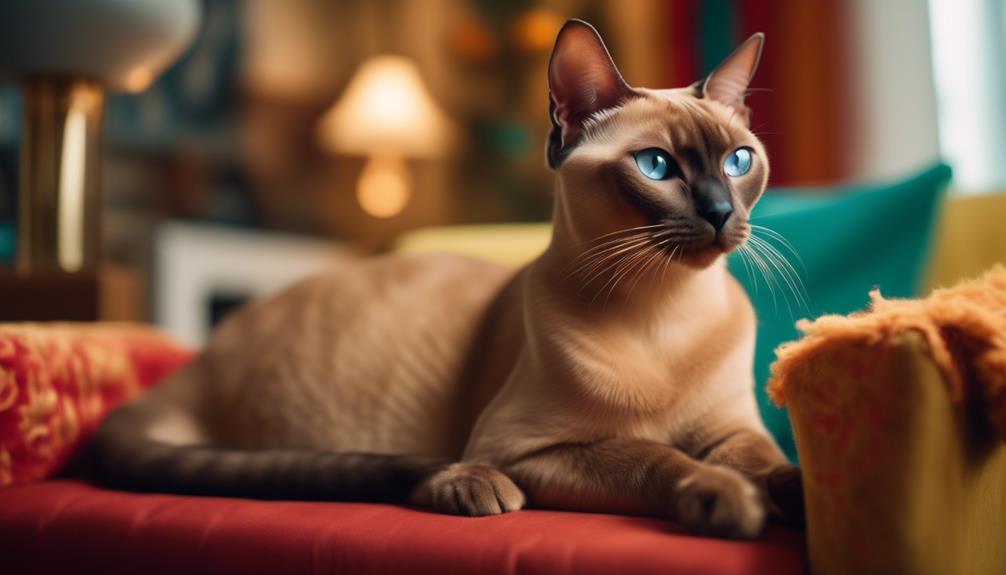
In summarizing the information presented, it is evident that Tonkinese cats are a delightful and friendly breed that thrive in environments where they receive ample attention and engage in interactive activities.
These cats are intelligent, playful, and doting, making them a great family companion.
They enjoy being involved in family activities and are social with new people. Tonkinese cats are not content with staying home alone all the time and demand attention and affection.
They have moderate to high exercise needs and are easy to train.
With their short, delicate, and silky coat, grooming is relatively low maintenance. However, regular dental hygiene and eye cleaning are necessary.
Frequently Asked Questions
Can Tonkinese Cats Get Along With Other Pets in the Household?
Tonkinese cats generally get along well with other pets in the household.
They are social and friendly, making adapting and forming relationships with other animals more accessible.
How Often Should Tonkinese Cats Have Their Teeth Professionally Cleaned?
The frequency of professional teeth cleaning for Tonkinese cats depends on their age, diet, and dental health.
It is recommended to consult with a veterinarian for an individualized dental care plan tailored to the cat’s specific needs.
Are Tonkinese Cats Prone to Excessive Shedding?
Tonkinese cats are not prone to excessive shedding. Their medium-thickness, short coat requires weekly brushing to minimize shedding.
However, regular grooming and a balanced diet can help maintain a healthy coat and reduce shedding.
Do Tonkinese Cats Require a Special Diet or Feeding Routine?
Tonkinese cats do not require a special diet or feeding routine.
However, it is important to provide them with a balanced and nutritious diet that meets their specific needs.
Consult with a veterinarian to determine the best diet for your Tonkinese cat.
How Do Tonkinese Cats Fare With Children in the Household?
Tonkinese cats generally fare well with children in the household.
They are known for their friendly and social nature, making them great companions for kids.
However, supervision and teaching children to handle cats gently is always recommended.
Conclusion
In conclusion, the Tonkinese cat breed is a unique and charming companion for cat lovers.
With their blend of Siamese and Burmese traits, these medium-sized cats possess a loving nature and moderate body type.
They are brilliant, playful, and social, making them a perfect addition to any family.
While they may be prone to certain health conditions, proper care and grooming can help ensure their overall well-being.
Overall, the Tonkinese cat is ideal for those seeking an intelligent, loving, and active feline companion.




